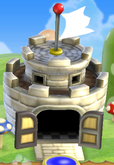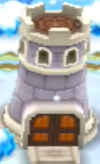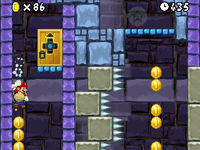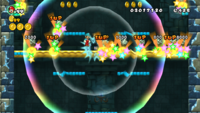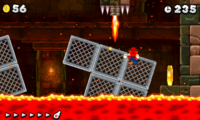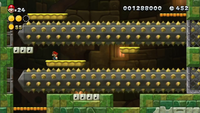Tower
- This article is about the towers found in the New Super Mario Bros. games. For the final world of Donkey Kong for the Game Boy, see Tower (world). For the tower from Super Mario Bros. 3, see World 5-Tower (Super Mario Bros. 3).
- Not to be confused with fortress.
Towers (called fortresses in New Super Mario Bros. Wii)[1] are a type of level in the Super Mario series and the later equivalent of the fortresses from Super Mario Bros. 3 and Super Mario World. Towers are always vertically oriented courses, where the player has to move upward to advance. In their appearances, Towers appear midway through every world (except for World 6 and World 8 from New Super Mario Bros. as well as Rock-Candy Mines from New Super Mario Bros. U, which have two). The challenge of towers generally depends more on traps and obstacles than enemies.
Starting from New Super Mario Bros. Wii, some worlds have no towers whatsoever. World 9 of New Super Mario Bros. Wii, the Special Worlds of New Super Mario Bros. 2, Peach's Castle and Superstar Road of New Super Mario Bros. U are examples.
History
Super Mario series
New Super Mario Bros.
At the top of every tower, there is a boss fight with Bowser Jr., who becomes increasingly more difficult as Mario (or Luigi) reaches each tower. When he is defeated, he gets back up and jumps off-screen (and out of the tower). Additionally, the first time Bowser Jr. is defeated in each tower, a brief cutscene ensues on the map, showing him running with Princess Peach to the castle of that world. Some worlds have 2 towers.
- World 1-
 Tower: The fight is simple, with no obstacles. Bowser Jr. runs at the player to attack.
Tower: The fight is simple, with no obstacles. Bowser Jr. runs at the player to attack. - World 2-
 Tower: The fight is a bit harder, as Bowser Jr. now has the ability to jump high, and there is quicksand on the arena.
Tower: The fight is a bit harder, as Bowser Jr. now has the ability to jump high, and there is quicksand on the arena. - World 3-
 Tower: Bowser Jr. can still jump high, and the fight is now held on a platform above a pool of water.
Tower: Bowser Jr. can still jump high, and the fight is now held on a platform above a pool of water. - World 4-
 Tower: Bowser Jr. changes his tactic; this time, he throws Koopa Shells, which need to be jumped on and tossed back.
Tower: Bowser Jr. changes his tactic; this time, he throws Koopa Shells, which need to be jumped on and tossed back. - World 5-
 Tower: Bowser Jr. does not throw shells, but the fight is on a pillar of ice, which reduces the player's traction, and is held over a bottomless pit.
Tower: Bowser Jr. does not throw shells, but the fight is on a pillar of ice, which reduces the player's traction, and is held over a bottomless pit. - World 6-
 Tower: The fight is on a see-saw, above a floor of spikes.
Tower: The fight is on a see-saw, above a floor of spikes. - World 6-
 Tower2: The fight is on a see-saw, this time above lava, with Bowser Jr. throwing shells.
Tower2: The fight is on a see-saw, this time above lava, with Bowser Jr. throwing shells. - World 7-
 Tower: Bowser Jr. throws shells, and the fight is on moving platforms.
Tower: Bowser Jr. throws shells, and the fight is on moving platforms. - World 8-
 Tower: Bowser Jr. throws shells, and the fight is like a small obstacle course, with burners and moving platforms.
Tower: Bowser Jr. throws shells, and the fight is like a small obstacle course, with burners and moving platforms. - World 8-
 Tower2: The final tower's fight is on yet another pillar above lava (complete with Lava Bubbles this time), still with shell-throwing added, and can jump high.
Tower2: The final tower's fight is on yet another pillar above lava (complete with Lava Bubbles this time), still with shell-throwing added, and can jump high.
New Super Mario Bros. Wii
At the end of the fortresses, there is a boss fight with the Koopaling of that world. After defeating them, they flee to the castle at the end of their respective world for a rematch. In the last tower, instead of a Koopaling, Magikoopa is fought instead. After defeating him, he flees to the Airship. However, he is not fought there again.
- World 1-
 Tower: The fight with Larry Koopa is extremely simple, with small bottomless pits on each side of the room.
Tower: The fight with Larry Koopa is extremely simple, with small bottomless pits on each side of the room. - World 2-
 Tower: Roy Koopa has a fight which is over a pit of quicksand.
Tower: Roy Koopa has a fight which is over a pit of quicksand. - World 3-
 Tower: The fight with Lemmy Koopa is on a floor of ice with two bottomless pits on each side, similar to Bowser Jr.'s fight in World 5-
Tower: The fight with Lemmy Koopa is on a floor of ice with two bottomless pits on each side, similar to Bowser Jr.'s fight in World 5- Tower in New Super Mario Bros.
Tower in New Super Mario Bros. - World 4-
 Tower: Wendy O. Koopa has a fight in a small room, similar to both her original fight in Super Mario Bros. 3 and Bowser Jr.'s in New Super Mario Bros.
Tower: Wendy O. Koopa has a fight in a small room, similar to both her original fight in Super Mario Bros. 3 and Bowser Jr.'s in New Super Mario Bros. - World 5-
 Tower: Iggy Koopa's battle has three shifting platforms.
Tower: Iggy Koopa's battle has three shifting platforms. - World 6-
 Tower: Morton Koopa Jr. has his fight over a pit of lava, with Skewers crashing down onto the side platforms.
Tower: Morton Koopa Jr. has his fight over a pit of lava, with Skewers crashing down onto the side platforms. - World 7-
 Tower: Ludwig von Koopa's battle has bottomless pits on each side like Larry Koopa.
Tower: Ludwig von Koopa's battle has bottomless pits on each side like Larry Koopa. - World 8-
 Tower: Magikoopa is fought on platforms coming in from the right of the room.
Tower: Magikoopa is fought on platforms coming in from the right of the room.
New Super Mario Bros. 2
At the end of every tower, there is a boss fight with a group of Reznors. After defeating them, the Koopaling of the world swings in and taunts at Mario, except for World 6, when the game just cuts to the world map.
- World 1-
 Tower: Two Reznors on one wheel with four rectangular Coin Blocks.
Tower: Two Reznors on one wheel with four rectangular Coin Blocks. - World 2-
 Tower/World 3-
Tower/World 3- Tower: Four Reznors on one wheel with four rectangular Coin Blocks.
Tower: Four Reznors on one wheel with four rectangular Coin Blocks. - World 4-
 Tower: Four Reznors on two wheels; two Reznors per wheel, with each wheel having four rectangular Coin Blocks. One bridge is positioned to the left of one wheel, while another bridge is positioned to the right of the other wheel.
Tower: Four Reznors on two wheels; two Reznors per wheel, with each wheel having four rectangular Coin Blocks. One bridge is positioned to the left of one wheel, while another bridge is positioned to the right of the other wheel. - World 5-
 Tower: Four Reznors on two wheels; two Reznors per wheel, with each wheel having four rectangular Coin Blocks. One bridge is positioned between the two wheels.
Tower: Four Reznors on two wheels; two Reznors per wheel, with each wheel having four rectangular Coin Blocks. One bridge is positioned between the two wheels. - World 6-
 Tower: Four Reznors on one giant wheel with eight rectangular Coin Blocks.
Tower: Four Reznors on one giant wheel with eight rectangular Coin Blocks.
New Super Mario Bros. U / New Super Luigi U / New Super Mario Bros. U Deluxe
At the end of the first six worlds' towers (excluding Rock-Candy Mines' second tower), there is a boss fight with Boom Boom, who, after Acorn Plains, has Magikoopa enhance his abilities. Afterward, the bosses of the second tower of Rock-Candy Mines and the tower of Meringue Clouds are Boss Sumo Bro and Magikoopa respectively.
- Crushing-Cogs Tower/Flame-Gear Tower: Boom Boom in his most standard boss fight.
- Stoneslide Tower/Wind-Up Tower: The room has quicksand underneath, and Boom Boom is given the power to spin jump. He keeps this ability in the following boss fights.
- Giant Skewer Tower/Shish-Kebab Tower: The room has water, and Boom Boom is given the power to jump, similarly to Super Mario Bros. 3.
- Freezing-Rain Tower/Icicle Tower: Same as Sparkling Waters, but the room has ice on the floor.
- Snake Block Tower/Stone-Snake Tower: Boom Boom enlarged.
- Grinding-Stone Tower/Smashing Stone Tower: Boom Boom given the power to fly, similarly to Super Mario Bros. 3.
- Screwtop Tower/Sumo Bro's Spinning Tower: Boss Sumo Bro, a Sumo Bro enlarged by Magikoopa, giving him the power to shock the entire ground.
- Slide Lift Tower/Stonecrush Tower: Magikoopa using magic blocks to crush the player.
The following are tower-related courses in Challenge Mode that have no origin.
- Fire, Bro! - Special
- Three Dry Bones - 1-Up Rally
Super Mario Run
In Super Mario Run, the courses Cutting-Edge Spire and Scaredy Rat Race take place in towers. These courses have modified movement rules compared to the rest of the game. The player can change direction with a Wall Jump or by sliding down a wall that they jumped to while standing next to it. Since Towers still have vertical layouts, and Super Mario Run has the player automatically run forward, this mechanic is required to climb both Towers. Neither course ends in a boss battle. Instead, a Warp Door leads to an exterior section played under normal rules, which includes a Goal Pole. This is similar to the secret exits of other Tower courses in the Super Mario series.
Tower courses are not used in the Toad Rally mode.
Super Smash Bros. series
A tower, particularly the Slide Lift Tower level, appears as one of the variations of the Mushroom Kingdom U stage in Super Smash Bros. for Wii U and Super Smash Bros. Ultimate, featuring a Slide Lift derived from said level. Like the other sections of Mushroom Kingdom U, different obstacles such as icicles and Water Geysers appear as stage hazards.
Profiles
New Super Mario Bros. 2
- Website description:
- English (British):
These annoying edifices block your path halfway through each World. You'll need to climb all the way to the tower's top before you can face the particular challenge it holds – on and up!
- English (British):
Gallery
The World 1-
 Towerfight in New Super Mario Bros.
Towerfight in New Super Mario Bros.
The World 2-
 Towerfight in New Super Mario Bros.
Towerfight in New Super Mario Bros.
The World 3-
 Towerfight in New Super Mario Bros.
Towerfight in New Super Mario Bros.
The World 4-
 Towerfight in New Super Mario Bros.
Towerfight in New Super Mario Bros.
The World 5-
 Towerfight in New Super Mario Bros.
Towerfight in New Super Mario Bros.
The World 6-
 Towerfight in New Super Mario Bros.
Towerfight in New Super Mario Bros.
The World 6-
 Tower2 fight in New Super Mario Bros.
Tower2 fight in New Super Mario Bros.
The World 7-
 Towerfight in New Super Mario Bros.
Towerfight in New Super Mario Bros.
The World 8-
 Towerfight in New Super Mario Bros.
Towerfight in New Super Mario Bros.
The World 8-
 Tower2 fight in New Super Mario Bros.
Tower2 fight in New Super Mario Bros.
Larry Koopa's fight in New Super Mario Bros. Wii
A fight against Reznors in New Super Mario Bros. 2 in World 1
A fight against Reznors in New Super Mario Bros. 2 in World 2 and World 3
A fight against Reznors in New Super Mario Bros. 2 in World 4
A fight against Reznors in New Super Mario Bros. 2 in World 5
A fight against Reznors in New Super Mario Bros. 2 in World 6
A fight against Boom Boom in New Super Mario Bros. U in Acorn Plains
A fight against Boom Boom in New Super Mario Bros. U in Layer-Cake Desert
A fight against Boom Boom in New Super Mario Bros. U in Sparkling Waters
A fight against Boom Boom in New Super Mario Bros. U in Frosted Glacier
A fight against Boom Boom in New Super Mario Bros. U in Soda Jungle
A fight against Boom Boom in New Super Mario Bros. U in Rock-Candy Mines
Names in other languages
| Language | Name | Meaning | Notes |
|---|---|---|---|
| Japanese | 塔[?] Tō |
Tower | |
| とりで[?] Toride |
Fortress | New Super Mario Bros. U names for individual tower levels | |
| Chinese (simplified) | 塔[?] Tǎ |
Tower | |
| 堡垒[?] Bǎolěi |
Fortress | New Super Mario Bros. U Deluxe names for individual tower levels | |
| Chinese (traditional) | 堡壘[?] Bǎolěi |
Fortress | New Super Mario Bros. U Deluxe names for individual tower levels |
| Dutch | Toren[?] | Tower | |
| French | Tour[?] | Tower | |
| German | Turm[?] | Tower | |
| Korean | 요새[?] Yosae |
Fortress | |
| Russian | Башня[?] Bashnya |
Tower |
Trivia
- The seven castles on the overworld map in Super Mario World appear as towers.
- In New Super Mario Bros. U, all the towers have Bowser Jr.'s face marked on the walls of the towers.
- Due to both the tower icon and map model resembling fortresses in New Super Mario Bros. Wii, New Super Mario Bros. U, and New Super Luigi U, there is some slight naming confusion across languages:
- The New Super Mario Bros Wii instruction manual refers to towers as "fortresses." However, the Prima Games guide refers to them as "Towers."[2]
- In the Japanese supplemental materials of New Super Mario Bros. and New Super Mario Bros. Wii, towers were identified as forts. In New Super Mario Bros. 2, the name was revised to tower, matching the English versions. Despite this, the names for individual tower levels in the Japanese versions of New Super Mario Bros. U and New Super Luigi U continue to call them forts.
References
- ^ 2009. New Super Mario Bros. Wii instruction booklet. Nintendo of America (American English). Page 9.
- ^ Bueno, Fernando (November 15, 2009). New Super Mario Bros. Wii PRIMA Official Game Guide. Prima Games (American English). ISBN 978-0-307-46592-4. Page 11.

